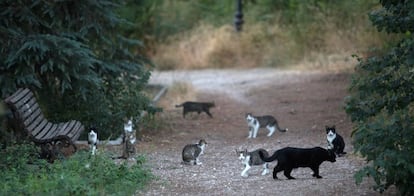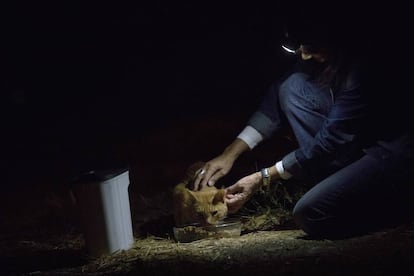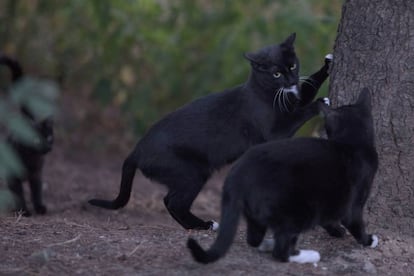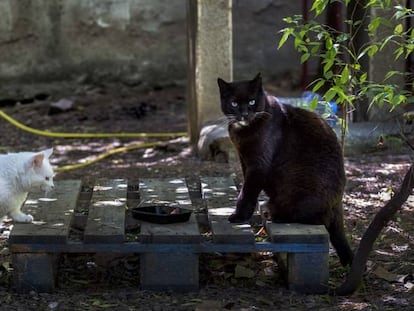Madrid¡¯s crazy cat ladies aren¡¯t crazy ¨C and they have a license
Carers backed by City Hall are looking after over 1,000 feral feline colonies but not all locals are happy with the system


Victoria de Lucio is a ¡°cat-holic.¡± Since 2009, this 60-year-old has been caring for various cat colonies across Madrid, especially those in her neighborhood in Ciudad Universitaria. She works as a librarian at the National Long Distance University (UNED) and every month she spends about €250 of her salary on feeding feral cats, getting them de-wormed and taking them to the vet if they get sick. She buys them cat food, gives them names and worries about their health.
There are 1,017 registered feral cat colonies in Madrid and more than 750 people who, like Victoria, have a special license from City Hall that allows them to feed and manage the colonies correctly.
What we are doing is good for the community, it¡¯s not just out of love for the animals
Cat carer Victoria De Lucio
Two years ago it was illegal to look after cat colonies and people could be slapped with fines of up to €300 if they were caught feeding street cats. But in 2016, Madrid Mayor Manuela Carmena approved a project to manage feral cat colonies.
Luis Maestre is not a cat-holic. This 49-year-old computer engineer has been living in the Nueva Espa?a neighborhood of the capital for six years. The area is also home to 50 stray cats. Come midday they can be seen hiding from the heat under the park hedges behind his building. Maestre complains about the smell, especially in summer, as well as the filth and their uncontrollable numbers. He has had more than one argument with the cat carer in his neighborhood, an older man with a white beard and a slow gait, and who also holds a special license.

De Lucio and Maestre represent both sides of the constant neighborhood battle over the cat colonies. Some think that the carers are simply crazy cat ladies (most of them are women) while supporters say the others are incapable of understanding the work they do. But both sides have more in common than they think.
In February 2017, Madrid authorities introduced a ¡°zero sacrifice¡± law to stop street cats from being put down. Before then, says Arancha Sanz, a lawyer for the Madrid Society for the Protection of Plants and Animals, ¡°whenever a neighbor complained about the cats, they were captured and taken to a shelter where they were put down.¡±
¡°This is not legal anymore, meaning everything goes through a real and ethical control of the colony,¡± explains the lawyer. The method used now is Trap, Neuter, Return ¨C or CER in its Spanish acronym.
¡°This way, the population is under control. The street cats are de-wormed, they are healthy and they don¡¯t upset the neighborhood because there are no more fights between males or females in heat,¡± she adds.
Children can¡¯t go into the sandpit because underneath it¡¯s filled with excrement
Luis, resident
Once a colony is identified for sterilization, experts say it¡¯s best for 70% to 80% of the cat population to be neutered. Otherwise, it is more difficult to capture the animals with cage traps. This job falls to the colony carers, who catch the animals with cages provided by animal protection groups or bought with their own money and take them in to be sterilized ¨C an operation they often also pay for with their own money.
Since the change to a Trap, Neuter, Return program, the La Fortuna Animal Protection Center in Madrid has performed 2,000 operations for free. But the waiting list for this service is so long that colony carers end up digging into their own funds to pay for the surgery. De Lucio spends €50 on each male cat and €60 on each female. She has already neutered 100 female cats.
¡°What we are doing is good for the community, it¡¯s not just out of love for the animals but for the good of the neighborhood,¡± she says. Once a male is sterilized he produces less felinine, the substance that causes the strong smell in cat urine, and he stops marking his territory because of the drop in hormones.
Every night after 11pm, when the neighbors won¡¯t see her, De Lucio spends an hour leaving food for the cats in the area. She does this throughout the year, regardless of whether it is winter or summer. ¡°I have even gone without taking holidays because there was no one to replace me and the cats have to eat,¡± she says. De Lucio takes care with how she leaves the food. ¡°We have to use our imagination to ensure that everything stays clean, so the birds don¡¯t take the food, so that the neighbors don¡¯t complain,¡± she explains.

De Lucio became a cat carer by chance. ¡°One day I was sitting at home, I looked out my window and I saw a cat with two kittens, trembling and seeking shelter from the snow. It broke my heart. I looked for them and began to give them food. Then I sterilized them and found a home for two of them and then, little by little, I began to care for the cats in the area in order to give them a more dignified life,¡± she says.
De Lucio has found an adoptive home for 60 cats. ¡°It¡¯s very rewarding when you see that you have changed the life of living beings, some of whom have been abandoned. Lots of people tell me, ¡®you care a lot about animals but what about starving children?¡¯ That¡¯s pure demagoguery. As if nothing else mattered to us,¡± she adds, noting that she also contributes to two non-profits that work with children.
Animal care is both a legal question and a public health issue. Municipal ordinances ban feeding street animals when they cause damage or health problems. That¡¯s why some cities, such as Madrid, have developed protocols to sterilize and feed the animals according to the law. The aim is to stop well-intentioned but uninformed residents from leaving their leftovers in the street, which can attract insects and rats, and lead to bad smells when the food decomposes.
The street cats don¡¯t upset the neighborhood because there are no more fights between males or females in heat
Lawyer Arancha Sanz
But a local resident named Luis says that despite the sterilization campaign, ¡°every so often there is a new litter of kittens, who are very sweet but also end up dirtying the area.¡±
¡°It¡¯s a hygiene issue,¡± adds the 60-year-old, who preferred not to give his surname. ¡°There is a huge problem with the children¡¯s playground, where kids can¡¯t go into the sandpit because underneath it¡¯s filled with excrement.¡±
Guadalupe Mir¨®, a veterinarian, says that ¡°if there is no direct contact, there is no risk. If you don¡¯t touch the cats, you can¡¯t get infected.¡±
¡°From the perspective of public health, it is much more positive to make the population healthy, to sterilize it,¡± says Mir¨®, who teaches at Complutense University in Madrid. ¡°If you have 10 cats in your area and they are sterilized, eating well and have a greater immune response against possible infectious diseases, you are guaranteeing a good state of health and you are minimizing many of these risks,¡± she adds. ¡°An animal under the control of a veterinarian is always better than an uncontrolled animal in an unknown state of health.¡±
English version by Melissa Kitson.
Tu suscripci¨®n se est¨¢ usando en otro dispositivo
?Quieres a?adir otro usuario a tu suscripci¨®n?
Si contin¨²as leyendo en este dispositivo, no se podr¨¢ leer en el otro.
FlechaTu suscripci¨®n se est¨¢ usando en otro dispositivo y solo puedes acceder a EL PA?S desde un dispositivo a la vez.
Si quieres compartir tu cuenta, cambia tu suscripci¨®n a la modalidad Premium, as¨ª podr¨¢s a?adir otro usuario. Cada uno acceder¨¢ con su propia cuenta de email, lo que os permitir¨¢ personalizar vuestra experiencia en EL PA?S.
?Tienes una suscripci¨®n de empresa? Accede aqu¨ª para contratar m¨¢s cuentas.
En el caso de no saber qui¨¦n est¨¢ usando tu cuenta, te recomendamos cambiar tu contrase?a aqu¨ª.
Si decides continuar compartiendo tu cuenta, este mensaje se mostrar¨¢ en tu dispositivo y en el de la otra persona que est¨¢ usando tu cuenta de forma indefinida, afectando a tu experiencia de lectura. Puedes consultar aqu¨ª los t¨¦rminos y condiciones de la suscripci¨®n digital.










































